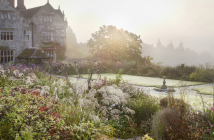To those across the pond the fourth Thursday in November heralds Thanksgiving and the start of the ‘holiday’ season. Having family and friends in the United States, and sensing impending excitement, I thought I would further explore this historical tradition. Is it a real celebration of thanks, and for what exactly? Or is it just an opportunity to indulge in feasting and festivity?
I have seen the photographs of family members sat round a table heaving with a turkey centrepiece and its various accompaniments. I have watched Steve Martin and John Candy struggle to travel from New York to Chicago in the movie Planes, Trains and Automobiles – a wonderful blend of comedy and pathos that also imparts a sense of urgency in the need to be home in time for the event.
 I have admired the Thanksgiving paintings of Norman Rockwell where, again, the sense of coming home, family and food are all too patent. These last three factors cover a period of some seventy years, I realise, Rockwell’s famed magazine covers being painted largely in the 1940s when there was an emphasis on military personnel being able to return home from WWII for the occasion. So, there is an enduring need, or desire, to maintain these traditions. Idealistic perhaps, but such is what shapes a cultural inheritance.
I have admired the Thanksgiving paintings of Norman Rockwell where, again, the sense of coming home, family and food are all too patent. These last three factors cover a period of some seventy years, I realise, Rockwell’s famed magazine covers being painted largely in the 1940s when there was an emphasis on military personnel being able to return home from WWII for the occasion. So, there is an enduring need, or desire, to maintain these traditions. Idealistic perhaps, but such is what shapes a cultural inheritance.
In the United States the tradition of Thanksgiving can be traced back to 1621 when a feast was prompted after a particularly good harvest in Plymouth, Massachusetts. The idea of giving thanks for this had been encouraged by the Pilgrims and Puritans that had travelled from England and brought with them their own customs of fasting and feasting – how interesting to observe what the difference of one vowel can make!
Strangely, the practice of celebrating the annual harvest in England was not established until the late 1660s. I began to wonder whether the concept grew from religious or secular foundations. A little research informs me that, in New England, church leaders were instrumental in proclaiming any ideas of thanksgiving. After 1682 it was a joint affair with the state until, after the American Revolution, it became wholly political but based on acknowledging the thanks due to God’s providence. President George Washington proclaimed the first nationwide thanksgiving celebration on 26 November 1789.
To some writers and researchers there is an element of “boosterism” – the American practice of ‘boosting’ the prospects of small towns – in explaining the continuing practice of Thanksgiving. Indeed, President Roosevelt changed the date of Thanksgiving, in 1941, from the last Thursday in November to the fourth Thursday – his reasoning being that an earlier celebration would give the whole country an economic uplift. I suppose here in England we would call it the “feel-good” factor, or a morale booster, for most people cherish their cultural pasts, their families and traditional values.  It seems certain that these are the defining influences that shaped Rockwell’s work – a need to portray such old values in a rapidly changing world. In the movie I mentioned above, the same values apply some forty years later in an even faster changing society.
It seems certain that these are the defining influences that shaped Rockwell’s work – a need to portray such old values in a rapidly changing world. In the movie I mentioned above, the same values apply some forty years later in an even faster changing society.
I tried to compare all this with our own thanksgiving celebrations. Well, we don’t have one as such. It seems it can only be measured by the harvest festivals that are held here. Somehow the thoughts of standing in a cold church, or in a school assembly hall, clutching an offering of fruit or vegetables – that will later be distributed amongst the poor and the homeless – does not have quite the same romanticism about it that is conjured up by the American version of getting home to family and friends and enjoying a wonderful dinner together. It would be easy to consider the influences of both, religious and secular, benefaction and socialities but this is perhaps pedantry and misses the greater importance of enduring cultural customs.
There is no fixed date for the Harvest Festivals of Thanksgiving in the United Kingdom. Rather, they are held on, or near, the Sunday of the harvest moon that occurs nearest to the autumnal equinox – late September or early October. Interesting to learn that 1 in 6 Britons now celebrate the holiday American-style here due, no doubt, to the dissemination and influence of American culture.

Norman Rockwell and ‘Planes, Trains…’ have always coloured my imagination of Thanksgiving. Perhaps it is fanciful but I know they are both heart-warming and reaffirm the belief that all is good somehow.
So, thank you. I’ve spread the word already.




